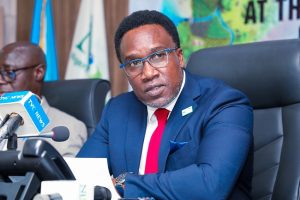Experts have observed that Africa is the most vulnerable continent to climate change impacts under all climate scenarios above 1.5 degrees Celsius.

The UN Environment Programme says Africa has contributed negligibly to the changing climate, with just about two to three percent of global emissions.
However, says the UN body, Africa stands out disproportionately as the most vulnerable region in the world. This vulnerability is driven by the prevailing low levels of socioeconomic growth in the continent
Africa faces exponential collateral damage, posing systemic risks to its economies, infrastructure investments, water and food systems.
Other areas at the receiving end of climate change in Africa are public health, agriculture, and livelihoods, threatening to undo its modest development gains and slip into higher levels of extreme poverty.
Data from AGRHYMET Regional Centre shows that more than 50 million people would experience food crisis in the region during the upcoming lean season from June to August, if appropriate measures were not taken.
The Director-General of AGRHYMET Regional Centre, Dr Abdul Ali, said this at the four-day 2024 Regional Climate Outlook Forum held in Abuja.
The event was a forum on climate outlook and seasonal forecasting of Agro-Hydro-Climatic Characteristics of the Sahel and the Sudan Region of West Africa.
Addressing climate change requires close attention to details and early warning signs and authorities say this is receiving.
Dr Benard Gomez, the representative of World Metrological Organisation (WMO) for West, Central and North Africa said with the support of the African Union Commission and Partners, an “Earlier Warning for all Action Plan” had been developed for Africa as well.
Gomez, who was represented by Mr Rowland Abah, said the UN had planned to prioritise early warning systems against climate disasters globally, by 2027.
“The state of climate in Africa report 2022 revealed that more than 110 million people on the African content were directly affected by weather, climate and water-related hazards in 2022.
“This would cause more than $8.5 billion in economic damages.
“The development of ‘Early Warning Systems’ to cover everyone on the planet with Early Warning Systems by 2027 is now a priority of the United Nation,” he said.
Gomez said WMO had migrated Global Data Processing and Forecasting Systems (GDPFS) to its Integrated Processing and Prediction System (WIPPS).
He said the migration would improve coordinate exchange of earth system observation, numerical weather prediction and access to model products.
Mr Festus Keyamo, the Minister of Aviation and Aerospace Development, assured that the Federal government would deploy climate-smart predictions and warnings to enhance socio-economic development of the citizens.
Specifically, he said the government would continue to take seriously, the issuance of disaster early warnings for its citizenry, to de-risk sectorial activities and avert losses.
Keyamo said the outcome of the regional climate outlook forum would be a great planning tool for governments and policymakers across the region.
“Experts and researchers in meteorology and climate sciences from across the West African sub-region and Sahel had dedicated their energy and intellect to develop a comprehensive forecast for the region, targeting the coming rainy season.
“Just as the general airspace is a continuum in aviation, weather and climate events are also trans-boundary, hence the need for us to work together irrespective of boundaries.
“We should downscale the outcomes of this forum to our local and rural communities to achieve the United Nations’ target of Early Warning for All (EW4ALL) by 2027,” he said.
The minister assured that Nigeria would continue to support regional efforts to mitigate the impact of climate change and encourage weather and climate-smart sustainable development
Speaking, Prof. Charles Anosike, Director General /Chief Executive Officer, NiMet, canvassed reliable seasonal forecasts for the Africa to mitigate impact of climate change.
Anosike said efforts toward reliable seasonal forecasts would not only reduce the impacts of climate change but also boost productivity across the region.
“Seasonal forecasting under increasing climate disasters can protect lives and property and this is key to achieving the United Nations Early Warnings for All.
“It is, therefore, crucial that we ensure our seasonal forecasting processes are reliable and validated to enable accurate and actionable prediction.
“We hope the outcome of this four-day exercise will provide our society with the necessary climate decision support to reduce the impact of climate disasters and boost productivity,” he said.
He said the 2024 regional climate outlook was timely as weather and climate events continued to take a toll on the region, despite tremendous advances and investments in climate science and operational forecasting.
He listed weather related hazards to include early or later onset of rainy seasons, droughts, floods and extended periods of extreme temperatures which trigger and account for a greater proportion of disaster losses.
“NiMet’s Seasonal Climate Prediction on Feb. 20, will continue to serve as an early warning tool to ensure improved preparedness for climate disasters, protect lives and critical national assets toward sustainable economic development.
“We are fully committed to regional climate outlook forum as it provides a platform for a consensus regional forecast,” he said.
The world has become a global village in this has effects on approaches to solving challenges facing mankind and the environment. The task of addressing climate change is enormous and requires multi-lateral and multi-sector approach
Mr Clement Nze, Director-General, Nigeria Hydrological Service (NIHSA), said the collaborative efforts within the region to produce a regional forecast had been useful in providing timely information to manage resources sustainably.
According to him, NIHSA recently presented the 2024 Annual Flood Outlook (AFO) for Nigeria.
“About 31 out of 36 states of the federation are expected to be flooded which calls for drastic early preventive actions to be taken.
“This effort is a testament to our commitment to use scientific methods and processes to tackle hydro-climatic challenges of this day and age.
“This forum, when scaled down to national level, often agrees with the predictions made, and serve as complementary for disaster risk management,” he said.
By Gabriel Agbeja, News Agency of Nigeria (NAN)
